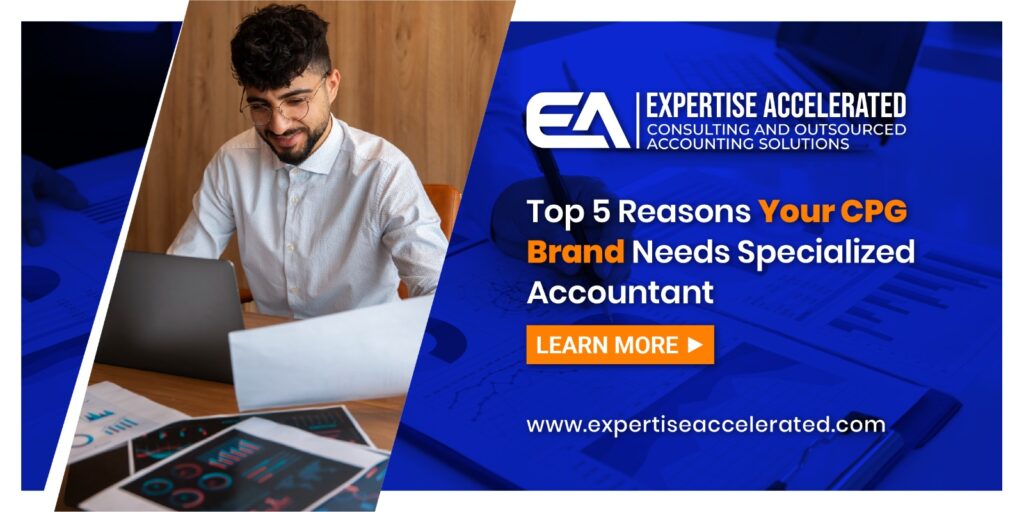In today’s talent market, securing a CPG accountant is less of a hire. It is more a strategic win.
There are 20% fewer accountants in the U.S. than just a year ago. CPA exam participation is down. Retirements are accelerating. And the professionals still in the game? They’re in the driver’s seat.
The war for finance talent isn’t coming. It’s already at our doorstep. Nowhere is this felt more acutely than in CPG, where margin pressure, inventory complexity, and promotional chaos demand accountants who get it. Not just any number-cruncher will do.
So, what happens when you don’t have CPG-specific talent on your accounting team?
In this guide you’ll learn:
- The hidden costs of not hiring a CPG accountant
- Why hiring a generalist could be slowing your growth
- The top 5 reasons your brand needs specialized CPG accounting expertise
Table of Contents
Why CPG Accounting Talent Is So Hard to Find

As stated earlier, many CPG firms do not have a CPG accountant because there is a general shortage of talent in the US.
The accountant shortage is more than just a hiring headache. As The Wall Street Journal reports, “More than 300,000 U.S. accountants and auditors have left their jobs in the past two years, a 17% decline, and the dwindling number of college students coming into the field can’t fill the gap.”
Wall Street Journal: Why Accountants Are Quitting in Record Numbers
It is increasingly becoming a struggle for firms to retain their existing accounting staff. It is an ongoing issue of the industry. In the CPG world, for a CFO, this problem becomes even more acute because CPG accounting is very specialized.
Already there is an accounting talent crisis and to find resources who have CPG experience further narrows the choices companies have available in terms of hiring.
Haroon Jafree, CEO of EA states that:
“For a typical CPG company, if the CFO has to hire people who do not have the right experience, then obviously the data quality may get impacted in terms of how the transactions are processed because that particular CPG approach of processing data may not be followed.
So overall, having good talent in the accounting world is a problem. And this is even more compounded for CPG companies because of the specialized knowledge required to run CPG accounting for areas like trade promotions management, cost of manufacture, and other areas unique to the CPG world.”
Not all accounting problems show up in the P&L. Some are quietly eating away at your data quality, forecasting accuracy, and decision speed. If your accounting team lacks CPG experience, you’re not just behind. You might also be misinformed.
Soft Skills vs. Industry Knowledge? You Don’t Have to Choose
Some argue that prioritizing CPG industry experience in hiring can mean overlooking top talent with exceptional data skills and business acumen. And they’re right to be cautious, great accountants aren’t just technical experts, they’re collaborators, communicators, and problem-solvers.
But the good news is, CPG brands don’t have to choose between the two.
The best CPG accounting partners hire for both, industry-specific expertise and the soft skills that drive alignment and action.
At our firm, we’ve designed our recruitment process to balance both qualities, because we know a high-performing remote team needs more than just technical knowledge, it needs people who can turn numbers into narratives and build trust across teams.
Let’s take a look at the top 5 reasons your brand needs a CPG accountant.
Top 5 Reasons Why Your Brand Needs a CPG Accountant

1. CPG accountants understand the nuances of the CPG industry more than the generic accountant.
If a CFO hires accountants without the right CPG knowledge and experience, it can lead to mistakes. Regular accountants may not understand issues like trade promotions or production costs. This can result in wrong financial data and bad decisions. A skilled CPG accountant can fix these problems and help the company grow.
CPG accountants understand the chaos behind trade promotions.
Trade promotions can make or break your bottom line, but only if they’re tracked, accrued, and reconciled properly. A generalist accountant might capture what happened. A CPG accountant will catch what shouldn’t have happened. They know how to set up systems that prevent leakage, flag overspend, and ensure every dollar tied to trade is accounted for accurately.
Pro Tip: Incorrect trade spend accruals distort your true margins and that’s a reporting risk finance leaders can’t afford.
CPG accountants understand that inventory is not just a line item.
From raw materials to finished goods, CPG inventory moves fast, and it gets messy. CPG accountants understand how to handle complex inventory valuation, landed costs, write-offs, and shrinkage. They ensure inventory flows through your financials in a way that aligns with real-world operations. Without CPG-specific expertise, you risk bloated balance sheets, inaccurate COGS, and poor inventory turns that kill cash flow.
2. CPG experts align your accounting with supply chain and production realities
CPG accountants bridge the gap between ops and finance. They don’t just wait for numbers. They help you shape them.
Whether you’re analyzing throughput costs, evaluating co-packer fees, or reviewing BOM changes, a CPG accountant knows what to look for, and what to question.
On the other hand, a generalist may record what they’re told. A CPG accountant challenges what doesn’t add up.
3. Help you move faster with cleaner data
CPG accountants help you move faster with cleaner data. Decision-making in CPG is a race. Retailers expect answers. Investors want updates. And your ops team needs clarity. But when your data is inconsistent or delayed due to incorrect setup, GL misalignment, or missing automation, you’re flying blind. CPG accountants are trained to structure your books to drive insights, not just compliance.
4. Future-Proof Your Finance Function
As your brand grows, so does the complexity. New SKUs. New channels. More promos. More data. If your accounting infrastructure isn’t built for scale, you’ll be patching holes just to keep the lights on.
CPG accountants think ahead. They help you set up scalable systems, workflows, and reporting tools that grow with your brand. Growth shouldn’t break your books. With the right accountant, it won’t.
5. They Don’t Need a Crash Course in CPG. They’re Ready on Day One
Hiring someone outside the CPG industry often means investing time (and money) into training them on how your world works. But if your team also lacks CPG experience, who’s doing the training?
Without a strong foundation in CPG-specific processes, even basic transaction processing can get messy. That leads to delays, inconsistent data, and poor decisions.
A CPG accountant steps in with the right knowledge. There is no ramp-up, no guesswork. Just clean execution from day one.
Why More CFOs Are Outsourcing CPG Accounting (and Why It Works)

Finding accountants who truly understand the complexities of the CPG industry is no easy task, especially when you’re hiring locally. That’s why many forward-thinking CFOs are turning to a hybrid outsourcing model. It’s not just about cutting costs; it’s about building a smarter, more resilient finance team.
With a small, strategic onshore group focused on decision-making and a dedicated offshore team handling transaction processing, businesses get the best of both worlds.
These offshore teams aren’t just generic back-office support. They’re experts in the CPG space, equipped with systems and redundancies that keep operations smooth even when team members change. The result? A happier onshore team, fewer staffing headaches, and a setup that’s built to scale with your business.
Faster Onboarding, Cleaner Books: The CPG Accounting Advantage with EA
EA’s CPG accountants understand the dynamics of how CPG brands work. They’ve worked across the full spectrum of CPG transactions, from trade spend and chargebacks to inventory flows and co-packer costs. That means faster onboarding, cleaner books, and financials that reflect your real-world operations.

